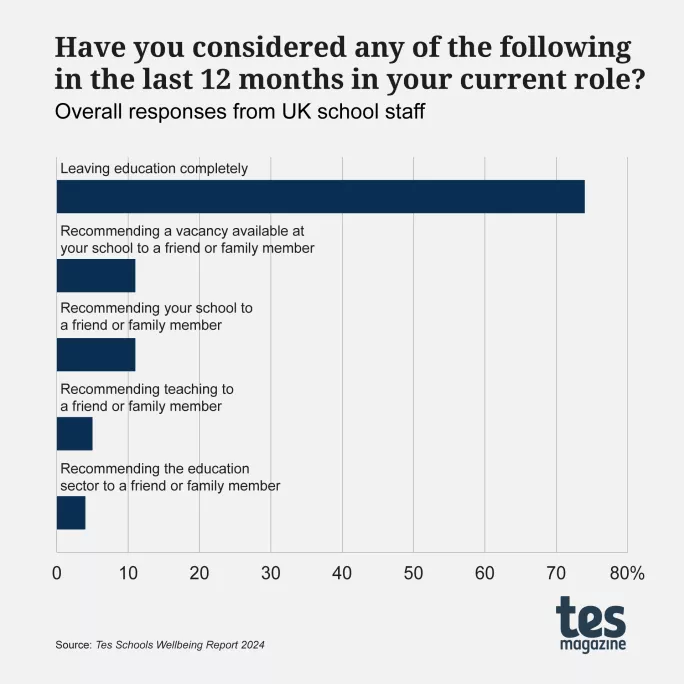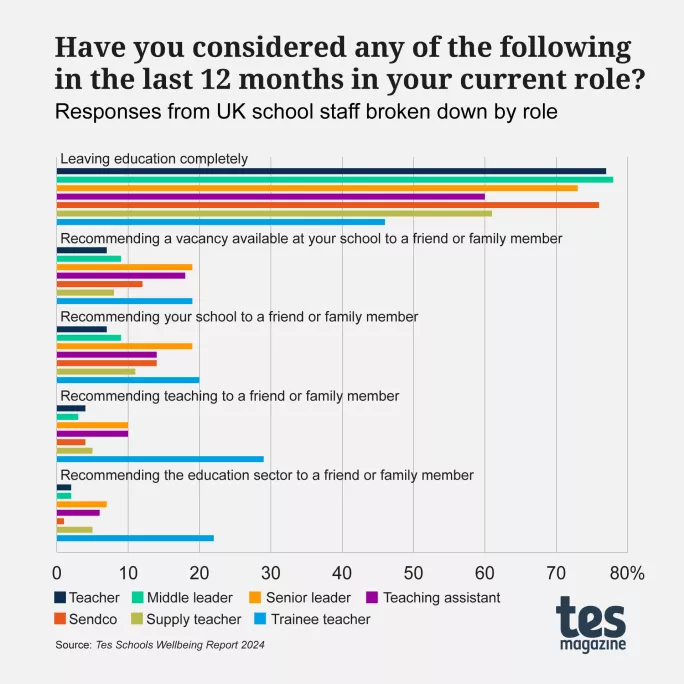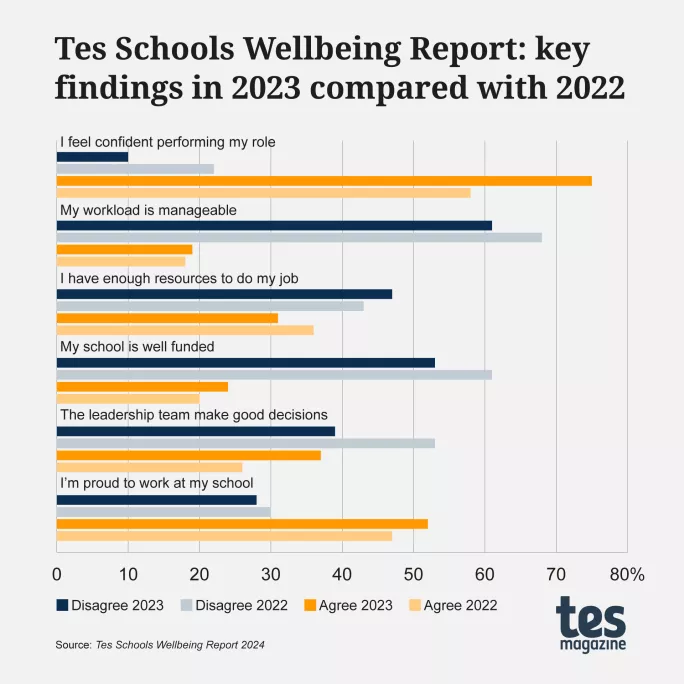Teachers’ views on wellbeing revealed in new survey

Almost three-quarters of school staff (74 per cent) say that they considered leaving education completely over the last 12 months, an annual Tes survey reveals.
However, the Tes Schools Wellbeing Report 2024, which surveyed more than 6,600 UK-based school staff, also revealed there has been a jump in confidence in staff’s ability to do their jobs.
Three-quarters (75 per cent) say they felt this in 2023 compared with just 58 per cent last year.
This is despite over six in 10 (61 per cent) of UK teacher respondents to the survey reporting they do not have a manageable workload, although this is a fall on the 68 per cent who reported this in 2022.


The results come after the latest Department for Education’s working lives of teachers and leaders survey revealed that the main reason cited by teachers and school leaders for thinking of leaving the sector was high workload.
The Tes survey, published today, revealed that teaching assistants surveyed appear to be more committed to staying in education.
Six in 10 (60 per cent) TAs say they considered leaving education in 2023, compared with 77 per cent of teachers, 78 per cent of middle leaders, 73 per cent of senior leaders and 76 per cent of Sendcos.
Meanwhile, almost half of trainee teachers (46 per cent) who responded to the survey say they considered leaving education completely over the last 12 months.
- 2022 survey: Workload is unmanageable, say most school staff
- DfE: 1 in 3 heads and teachers consider quitting
- Workload: 23 tasks teachers should not have to do
Earlier this year, the government said it would scrap performance-related pay progression amid concerns about the workload burden it creates for teachers and school leaders.
More schools are implementing time-saving behaviour management software; 36 per cent of staff say this was happening at their school compared with 32 per cent the year before, according to the Tes survey.
Despite this, the gulf between state and independent school staff feeling overwhelmed by work pressure continues to be significant, with almost two-thirds (64 per cent) of state school staff reporting unmanageable workloads compared with just under a third (31 per cent) in independent schools.
Over half of staff are proud of their school
The Tes annual survey also reveals that over half (52 per cent) of UK school staff are proud to work at their school.
Meanwhile, there was a 14 per cent rise in the proportion of school staff who feel they have the autonomy to make decisions within their role, with just under half (45 per cent) reporting this - perhaps reflecting a move away from the legacy of centralised top-down decision making seen during the pandemic.
Also, 11 per cent more school staff (37 per cent) say they feel their leadership team makes good decisions than they did last year.
Three-quarters of staff say they feel confident in their ability to perform their roles - up from 58 per cent the year before.

This is despite almost half (47 per cent) of school staff respondents feeling they don’t have enough resources to do their job - up from 43 per cent last year - and just a quarter (24 per cent) agreeing their school is well-funded
Meanwhile, in England only, half of school staff (50 per cent) say they do not get the opportunity to work flexibly.
Just over one in 10 (11 per cent) say they got this opportunity in their current role, while 18 per cent say they did get the opportunity to work flexibly but would like this improved.
Would you recommend working in education?
Overall, just over one in 10 (11 per cent) say they had considered recommending their school or a vacancy at their school to a friend or family member over the past 12 months.
This fell to just 7 per cent of teachers, while only 9 per cent of middle leaders who answered say they considered this.
However, both senior leaders and TAs were far more likely to say they considered recommending a vacancy at their school, with nearly one in five (19 per cent) of higher-ranking staff and a similar proportion (18 per cent) of TAs saying they would.
An even lower proportion - just 5 per cent - of all school staff who responded to the survey say they thought about recommending teaching to a friend or family member in the last 12 months, while just 4 per cent say the same about the education sector as a whole.
Higher salary satisfaction in Scotland
England has the lowest school staff satisfaction with salary, according to the survey.
Under one-fifth (19 per cent) of staff say they had a good salary, compared with 25 per cent in Wales and 35 per cent in Scotland.
Last year, the government accepted the pay body’s recommendation that teachers receive a 6.5 per cent pay rise from September 2023. The deal came after a long-running dispute over pay and months of strike action by teachers.
In 2022-23, experienced teachers in England received a 5 per cent pay rise.
Meanwhile, in the Scottish Parliament yesterday - responding to concerns about the attrition rate of probationer teachers - first minister Humza Yousaf said that efforts to portray teaching as an attractive profession were helped by starting salaries in Scotland being the highest in the UK.
Government must get grip on teacher shortage crisis
Geoff Barton, general secretary of the Association of School and College Leaders, said that the findings “reflect the fact that workload and working hours remain a significant concern among both classroom teachers and school leaders”.
He added: “There needs to be significant and impactful reductions to workload and improvements to wellbeing to address the critical problems with recruitment and retention.
“The government knows this already but has failed to adequately address the systemic pressures driving people out of the profession.”
James Bowen, assistant general secretary of the NAHT school leaders’ union, said: “These findings echo everything we hear from school leaders and teachers about the intolerable workload and long hours they and their staff are facing, and the impact on their wellbeing.
“There is no other way to describe this than a crisis, and it’s a crisis the government needs to get an urgent grip on.”
For the latest education news and analysis delivered directly to your inbox every weekday morning, sign up to the Tes Daily newsletter
You need a Tes subscription to read this article
Subscribe now to read this article and get other subscriber-only content:
- Unlimited access to all Tes magazine content
- Exclusive subscriber-only stories
- Award-winning email newsletters
Already a subscriber? Log in
You need a subscription to read this article
Subscribe now to read this article and get other subscriber-only content, including:
- Unlimited access to all Tes magazine content
- Exclusive subscriber-only stories
- Award-winning email newsletters
topics in this article



